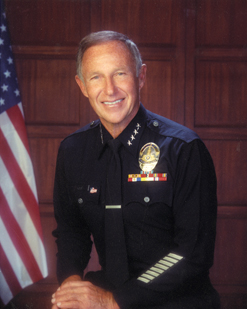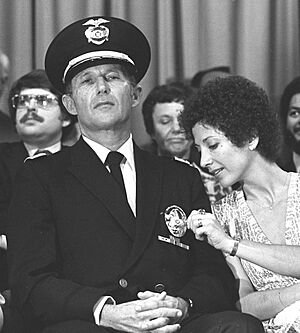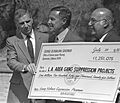Daryl Gates facts for kids
Quick facts for kids
Daryl Gates
|
|
|---|---|

Official portrait
|
|
| Chief of the Los Angeles Police Department | |
| In office March 28, 1978 – June 27, 1992 |
|
| Preceded by | Edward M. Davis |
| Succeeded by | Willie L. Williams |
| Appointed by | Tom Bradley |
| Personal details | |
| Born |
Darrel Francis Gates
August 30, 1926 Glendale, California, U.S. |
| Died | April 16, 2010 (aged 83) Dana Point, California, U.S. |
| Political party | Republican |
| Awards | Police Meritorious Unit Citation Police Meritorious Service Medal 1984 Summer Olympics Ribbon 1987 Papal Visit Ribbon 1992 Civil Disturbance Ribbon |
| Police career | |
| Department | Los Angeles Police Department |
| Years of service | 1949–1992 |
| Rank | Sworn in as an officer (1949) Commander (1965) Chief of Police (1978) |
| Other work | Businessman/entrepreneur, talk-show host, radio commentator |
Daryl Francis Gates (born Darrel Francis Gates; August 30, 1926 – April 16, 2010) was an American police officer. He served as the Chief of the Los Angeles Police Department (LAPD) from 1978 to 1992. He held this important position for a long time. Gates is known for helping create the SWAT teams. He also co-founded the Drug Abuse Resistance Education (DARE) program.
Contents
Early Life and Education
Daryl Gates was born in Glendale, California, on August 30, 1926. He grew up in Glendale and Highland Park, which is in Los Angeles.
He went to Franklin High School. After that, he joined the U.S. Navy. He served during World War II in the Pacific Ocean. After the Navy, he studied at Pasadena City College. He also took pre-law classes at the University of Southern California (USC). A friend suggested he join the LAPD. Gates later finished his degree at USC.
Police Career
Gates joined the LAPD on September 16, 1949. Early in his career, he was chosen to be the driver for Chief William H. Parker. Gates learned a lot about police work and leadership from Chief Parker during this time.
Gates worked hard and scored very high on his promotion tests. He became a sergeant and then a lieutenant. As a lieutenant, he worked closely with Chief Parker again. He was later promoted to captain, in charge of intelligence. By 1978, Daryl Gates became the 49th Chief of the LAPD.
Creating SWAT Teams
Gates helped create a special police unit called SWAT. SWAT stands for "Special Weapons And Tactics." This unit was formed to handle very dangerous situations. These included hostage rescues and dealing with armed suspects. Before SWAT, regular police officers were not always ready for such intense events.
In 1965, Officer John Nelson had the idea for a specially trained team. Gates, who was an inspector then, approved this idea. The first SWAT team was formed within the LAPD. It had fifteen teams of four officers each. These officers received special training and equipment. SWAT was quickly copied by many police departments. Now, police forces all over the world use SWAT teams.
In his book, Gates explained that he supported the idea of SWAT. He helped his officers develop the tactics and equipment for the team.
Founding D.A.R.E.
Gates also helped start the DARE program. DARE stands for Drug Abuse Resistance Education. He created it with the Rotary Club of Los Angeles. DARE teaches students and children about the dangers of drug abuse. Today, DARE is a worldwide program. It is used in schools across the globe.
Special Order 40
In 1979, Gates helped create and put in place Special Order 40. This rule stops police officers from stopping people just to check their immigration status. The goal was to make sure people felt safe reporting crimes. They would not have to fear being deported.
Rodney King Incident and Los Angeles Unrest
On March 3, 1991, Rodney King was arrested by LAPD officers. A person nearby recorded the arrest on video. Gates and his department faced strong criticism after this event. The mayor, Tom Bradley, asked Gates to resign. Gates refused at first.
A report called the Christopher Commission report was released. It suggested changes for the police department. Gates announced he would resign on July 13, 1991. He left the LAPD on June 28, 1992. Willie L. Williams became the new Chief.
Ig Nobel Prize
In 1992, Daryl Gates received the satiric Ig Nobel Peace Prize. This award is for achievements that "first make people laugh, and then make them think." He received it for his "uniquely compelling methods of bringing people together."
Later Work
After leaving the LAPD, Gates stayed busy. He worked with Sierra to create a computer game called Police Quest: Open Season. He even appeared as the Chief of Police in the game. Gates also advised on the SWAT video game series. He was a talk show host on the radio station KFI for a short time. He often spoke on radio about police issues.
Businessman
Gates was the President and CEO of Global ePoint. This company focused on security and digital surveillance. He also served on the advisory board for PropertyRoom.com. This website holds online auctions for items found by police.
Autobiography
In 1992, Gates published his autobiography. It was titled Chief: My Life in the LAPD. He wrote it with Diane K. Shah. The book shares details about his career and important cases.
Death
Daryl Gates passed away on April 16, 2010. He was 83 years old. He died at his home in Dana Point, California. His death was due to complications from bladder cancer.
Images for kids
-
Gates (center) with Governor George Deukmejian and County Sheriff Sherman Block, 1986.



